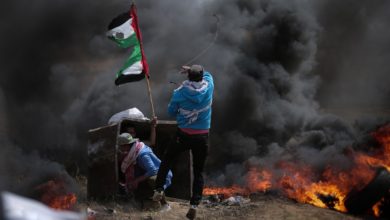 Photo: Paul Weinberg |
Labor struggles at two major mining operations shook the gold industry in South Africa during the spring months against a backdrop of rising unemployment, threatened layoffs and a possible corporate merger.
The struggle broke into the open on March 24 when members of the National Union of Mineworkers (NUM) went on strike against Harmony Gold mines to protest low wages, threatened job cuts, poor living conditions and safety issues. The job cuts have been trumpeted by Harmony as a way to cut costs ahead of their plans to buy out rival Gold Fields. If successful, the merger would create the largest gold mining operation in South Africa.
Harmony pushed for continuous operations on top of a seven-day workweek. The NUM agreed to this as a concession to stave off cutbacks. But when Harmony tried to renege on the deal by announcing layoffs anyway, 20,000 Harmony miners walked off the job for eight days, costing the company $18 million. Thirty thousand other miners at Gold Fields mining operations also threatened to strike for better wages and living conditions, but were held back by a labor court order.
The 20,000 miners at Harmony Gold won improved working conditions to settle the strike. Management agreed to eliminate racist policies such as discriminatory pay practices against Black workers and different maternity policies toward white and Black women. The NUM also won a reprieve from cutting back 5,000 miners that Harmony Gold had tried to lay off.
 Photo: Javier Soriano/AFP/Getty Images |
The April elections in the Basque provinces in Spanish-held territory brought a little known communist party to the forefront of the Basque movement for self-determination. The Communist Party of the Basque Lands (PCTV) stepped into the limelight by garnering nine seats in the recent elections—after announcing its existence only months earlier.
The PCTV’s sudden success was widely seen as a result of the Spanish government’s decision to ban the Basque leftist organization Batasuna. Batasuna has refused to condemn the Basque armed liberation group Basque Homeland and Freedom (ETA). After Batasuna and a related party were both banned, the group called for its supporters to cast their ballots for the PCTV. The PCTV calls for the self-determination of all the Basque peoples without outside interference
Batasuna had previously held seven seats in the regional Basque Parliament. So the PCTV’s win of nine seats was recognized as a gain for the left.
As part of a long-standing policy of repression against the Basque people’s struggle, the Spanish government—under both the socialist and conservative governments—is using the recent “war on terror” to outlaw the political associates of ETA.
 Photo: Raed Qutena |
In reaction to their unbearable working conditions, over 1,000 Bangladeshi workers stormed the Bangladesh embassy in Kuwait on April 24. The workers were protesting six months of missing wages—a common situation for foreign workers in the Middle East.
At the same time, 450 Asian cleaning workers went on strike over unpaid wages against a firm that has repeatedly violated labor policies.
About half of Kuwait’s population of 2.3 million is foreign-born.
Philippine transport workers strike for lower gas prices
In a show of force that shook the public transportation industry, the major transport unions in the Philippines launched a strike on April 18 to protest rising gas prices. The strike was called by largest transport union in the capital, Manila, the 250,000-member PISTON. Other transport unions later joined the strike across the country. Many of the commercial and financial centers were brought to a standstill as commuters were left without any means to get to work.
 Photo: EPA/Rolex Dela Pena |
A representative from the leftist organization Bayan Muna called for doing away with the oil deregulation law because the three big oil firms Caltex, Petron and Philippines Shell were operating as a cartel.
PISTON itself held another strike action on May Day, showing the continuing burden increased prices put on all workers.





